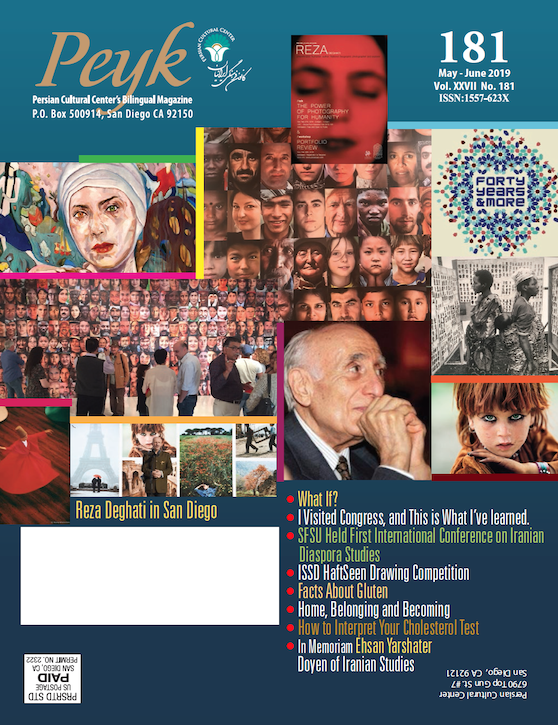SFSU Held First International Conference on Iranian Diaspora Studies

By Aria Fani
We know who studies Iran, its history, culture, languages, and literature. By ‘we’ I mean the Iranian community in California. Most of us have at least heard of such names as Ehsan Yarshater, Amin Banani, and Ahmad Karimi-Hakkak, and have come across scholarly projects like the Encyclopedia Iranica. UCLA, UCI, and UC Berkeley all have dynamic programs in Iranian Studies while students studying in most universities across California can take Persian-language classes and Iran-related courses. But what about Iranians who live outside of Iran? Has Iranian diaspora, in the past four decades, become a scholarly object worthy of careful study? By that I mean, is our global community sizable enough and do we produce enough art and literature to warrant a focused academic study? If so, then who studies us?
If you were at San Francisco State University’s International Conference on Iranian Diaspora Studies on March 29th and 30th, you would have received clear answers to all those questions and left with questions that you did not even have from the beginning. Let me give you some background. In 2016, SFSU received a gift of million dollars from its alumna, Neda Nobari, an Iranian philanthropist, in order to establish a center for the study of Iranian diaspora. SFSU selected Dr. Persis Karim, previously a professor of English and Creative Writing at San Jose State University, as the chair of the newly-established Center. If you have been reading Peyk for the past fifteen years, you may remember Zohreh Ghahremani’s review of Karim’s edited anthology Let Me Tell You Where I’ve Been: New Writing by Women of the Iranian Diaspora, published in 2006.
The Center for Iranian Diaspora Studies is the first of its kind anywhere in the world. It provides a scholarly platform for academics who study the Iranian immigrant condition, perspective, and experience from within a multitude of disciplines ranging from sociology to refugee studies. The Conference on Iranian Diaspora Studies was the Center’s first major project. If you take a look at its program (available at: cids.sfsu.edu/content/conference-program), you will notice a number of exciting factors. This emerging field is led by young female scholars who are not just contributing to a new scholarly domain, but are redefining what it means to be Iranian. They are highly conscious of race, gender, sexuality, and socio- economic status, and their critical awareness is fully reflected in their works.
Take Neda Maghbouleh’s newly-published book The Limits of Whiteness: Iranian Americans and the Everyday Politics of Race (2017), which was also reviewed in Peyk. In her study, Dr. Maghbouleh confronts the question of race, a less commonly discussed subject among most Iranians, in a way that is critical, fully conversant with scholarly conversations in other fields and disciplines, and refreshingly aware of its moral stakes in the real world. Maghbouleh was one of many keynote speakers at the conference.
Another factor you would notice is how diverse the scholarly inquiries in Iranian Diaspora Studies are, reflecting training in various fields: anthropology, sociology, literary studies, theatre, art history, refugee studies, and so many more. What I find extremely exciting is that these scholars are not merely pursuing these inquiries within the bounds of their discipline’s received wisdom and scholarly conventions. They are challenging the type of questions and assumptions an anthropologist or sociologist is expected to make of his or her object of study, and in so doing, they are actively expanding and changing their own disciplines, beginning with the fact that no discipline in the twenty first century can pose as self-contained. All disciplines are necessarily in conversation with one another and those conversations are fundamental to how they define and redefine themselves. Lastly, I was struck by the multiregional scope of the talks presented at the conference. Speakers gave a loud nod to the fact that Iranians do not just live in Los Angeles, Toronto, and Stockholm, but also in Dubai, Lima, and Kuala Lumpur.
Since Persis Karim obtained her Ph.D. from the University of Texas, Austin, in 1998, the study of Iranians in diaspora has come a long way, in no small part thanks to her pioneering efforts and mentorship of young scholars who are now leading the field. Iranian Studies may be a more longstanding scholarly field, but it can certainly learn so much from the emerging field of Iranian Diaspora Studies when it comes to critically integrating ongoing debates in race, gender, and sexuality studies. I am also very happy as a proud alumnus of the California State University system that the new Center is housed at SFSU, which has a long tradition of social justice that dovetails well with a generation of Iranian-American scholars who have made it their mission to create a language surrounding Iran and Iranians that affords more complexity and nuance.
Aria is Peyk’s self-designated NorCal correspondent.